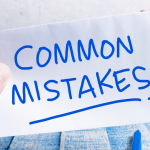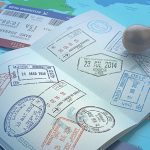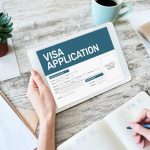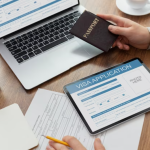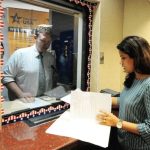What is a Visa Interview?
A visa interview is an essential basic part of the visa application process. It allows the consular officer to assess your eligibility for the visa you are applying for. The interview aims to verify the information provided in your application, ensure you have a legitimate reason for travel, and confirm that you have strong ties to your home country.
Table of Contents
Why is the Visa Interview Important?
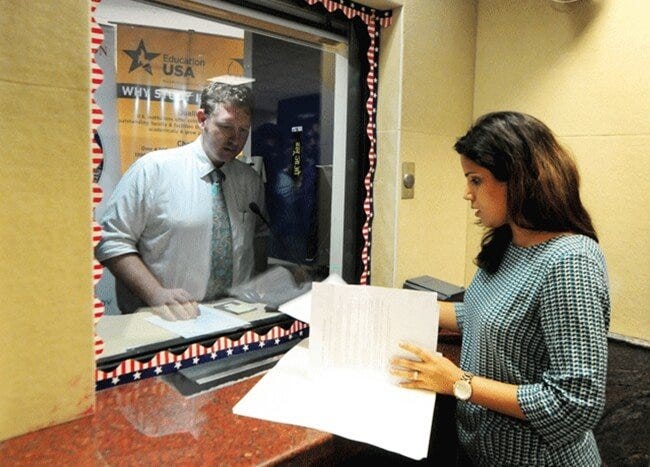
The visa interview is crucial because it directly impacts the approval or denial of your visa application. The consular officer will evaluate several factors, such as:
- Purpose of Your Trip: Why do you want to travel to the specific country?
- Financial Stability: Can you support yourself during your stay?
- Intentions After the Visit: Will you return to your home country once your visa expires?
- Consistency in Information: Does your verbal information match the documents provided?
Common Types of Visa Interviews
Visa interviews vary based on the type of visa you are applying for. Understanding the specific focus and requirements of each type of interview can help you prepare better. Here’s a more detailed look at the four common types of visa interviews:
1. Tourist Visa Interviews
Purpose: To ensure that applicants are visiting for genuine tourism or leisure purposes and have no intentions of staying beyond their visa’s validity.
Key Focus Areas:
- Travel Plans: The consular officer will ask about your travel itinerary, including your destination(s), duration of stay, and specific places you plan to visit. They may want to see proof of hotel bookings, travel arrangements, and a return ticket.
- Duration of Stay: You will need to clearly state how long you plan to stay in the country and provide a reason for the chosen duration.
- Financial Capability: You must demonstrate that you have sufficient funds to cover all expenses during your trip, such as accommodation, food, transportation, and activities. Bank statements, salary slips, or sponsorship letters are often required.
- Intent to Return: Consular officers look for evidence that you have strong ties to your home country, such as a job, family, property, or other commitments, ensuring you will return after your visit.
Common Questions:
- Why are you visiting this country?
- How long do you plan to stay?
- Who is funding your trip?
- What are your plans after the visit?
2. Student Visa Interviews
Purpose: To evaluate whether the applicant genuinely intends to study and has adequate financial resources and plans to return home after completing their education.
Key Focus Areas:
- Academic Goals: The officer will ask about your academic background, why you chose the particular course or program, and how it aligns with your career objectives. Be prepared to explain why you chose a specific university or college.
- Choice of University: You need to justify why you selected the specific institution and program, demonstrating that you have researched your options and made an informed decision.
- Plans After Education: The consular officer will assess your intentions post-graduation. They want to know if you plan to return to your home country or if you have other plans that comply with the visa regulations.
- Financial Proof: You must show that you can afford tuition fees and living expenses without needing to work illegally. This usually involves providing bank statements, scholarship letters, or proof of sponsorship.
Common Questions:
- Why did you choose this university/program?
- How does this program fit into your career plans?
- Who is financing your education?
- Do you plan to return to your home country after your studies?
3. Work Visa Interviews
Purpose: To determine whether the applicant has a legitimate job offer and meets the qualifications for employment in the destination country.
Key Focus Areas:
- Job Offer Details: The officer will review your job offer letter, including details of the position, salary, duration of employment, and job duties. They may ask questions to ensure the job is legitimate and that your qualifications match the role.
- Employer Information: You may be asked to provide information about the hiring company, its business operations, and why they chose you over other candidates.
- Professional Qualifications: Be prepared to discuss your educational background, work experience, certifications, and any specialized skills that qualify you for the job. The officer will verify that your qualifications meet the visa category’s requirements.
- Intentions and Compliance: You need to show that you intend to work only as permitted by the visa and comply with the destination country’s laws and regulations.
Common Questions:
- What is your job role, and how did you get the offer?
- Why did you choose this employer?
- Can you describe your work experience and qualifications?
- Do you plan to return to your home country after your employment ends?
4. Immigration Visa Interviews
Purpose: To assess whether the applicant qualifies for immigration, usually through family sponsorship, employment, or investment, and intends to comply with immigration laws.
Key Focus Areas:
- Family Ties: For family-sponsored immigration, you must provide proof of your relationship with the sponsor, such as birth certificates, marriage certificates, or photos.
- Intent to Immigrate: The consular officer will ask questions to verify your intent to immigrate permanently, understanding your reasons for moving and plans for integrating into the new country.
- Employment Prospects: If you are immigrating for employment, the officer may ask about your job offer, qualifications, and how you plan to support yourself and your family.
- Financial Stability and Background Checks: You will need to demonstrate that you have the financial means to support yourself or that you have a sponsor who will do so. Background checks for criminal history or previous immigration violations are also standard.
Common Questions:
- Why do you want to immigrate to this country?
- Who is sponsoring you, and what is your relationship with them?
- Do you have a job offer or employment prospects in the destination country?
- How do you plan to support yourself and your family after immigrating?
Steps to Prepare for Your Visa Interview
1. Understand the Visa Requirements
Before the interview, ensure you understand the requirements of the specific visa you’re applying for. Visit the official website of the embassy or consulate to know about:
- Necessary documents.
- Financial proof.
- Valid reasons for travel.
Refer to Visa Guidelines for detailed instructions on different visa types.
2. Gather All Necessary Documents
Prepare a complete set of documents, including:
- Valid passport.
- Visa application form.
- Passport-sized photographs.
- Financial documents (bank statements, salary slips).
- Proof of purpose (invitation letter, travel itinerary, university admission letter).
- Supporting documents (property deeds, employment letters).
Having all your documents in order will show that you are prepared and organized. Check the Visa Documentation Checklist for a detailed list.
3. Practice Common Interview Questions
Here are some typical questions you may encounter during your interview:
- Why do you want to visit this country?
- Who is sponsoring your trip?
- What are your plans after the visa expires?
- Why did you choose this university/job?
- Do you have any relatives in the country?
Practicing answers to these questions will help you stay calm and articulate during the actual interview.
4. Dress Professionally
Your appearance makes a strong first impression. Dress in formal or business attire that reflects your respect for the process. Avoid flashy or casual clothing, and ensure you look neat and well-groomed.
5. Be Honest and Confident
Always answer questions truthfully and confidently. Consular officers are trained to detect dishonesty, so maintaining eye contact and providing clear answers is crucial. If you don’t know an answer, it’s better to admit it than to fabricate a response.
6. Understand the Local Language and Culture
Depending on the country you are applying to, understanding basic cultural norms and language can be beneficial. This shows respect for the consular officer’s culture and could positively impact your interview outcome.
What to Expect on the Interview Day
Arrival at the Embassy/Consulate:
- Arrive at least 30 minutes before your scheduled interview time.
- Bring all necessary documents, including your appointment confirmation and ID.
- Be prepared for security checks; avoid carrying electronic devices or prohibited items.
During the Interview:
- Be polite and greet the consular officer.
- Listen carefully to each question and respond concisely.
- Provide documents only when requested.
After the Interview:
- You may be informed about the decision immediately or asked to wait for further processing.
- If approved, follow the instructions provided to collect your visa.
- If denied, ask for the reasons for denial and address any issues if you plan to reapply.
Resources to Help You Prepare
- Mock Visa Interview Practice Guide
- How to Handle Visa Interview Rejection
- Top Mistakes to Avoid During a Visa Interview
FAQs
Here are some common questions about visa interview including answers. Read to know more:
Q1. What should I bring to my visa interview?
Answer: It is essential to bring all required documents to your visa interview. These typically include:
- Valid Passport: Ensure that your passport is valid for at least six months beyond your intended stay.
- Visa Application Form: A completed and signed visa application form.
- Appointment Confirmation: Proof of your scheduled interview appointment.
- Photographs: Passport-sized photographs that meet the embassy or consulate’s specifications.
- Supporting Documents: Depending on the visa type, this could include bank statements, employment letters, sponsorship letters, travel itineraries, admission letters, or any documents supporting your visa application.
- Proof of Payment: Receipt of the visa application fee payment.
Make sure to check the specific requirements of the embassy or consulate where you are applying, as they may request additional documents.
Q2. How can I increase my chances of getting a visa approval?
Answer: To increase your chances of getting a visa approval:
- Be Honest and Consistent: Provide truthful and consistent information on your application and during your interview. Any discrepancies may lead to denial.
- Prepare Thoroughly: Understand the purpose of your visit and be ready to explain it clearly. Practice answering common interview questions and gather all required documents well in advance.
- Show Strong Ties to Your Home Country: Demonstrate that you have compelling reasons to return to your home country, such as a job, family, property, or other commitments.
- Demonstrate Financial Capability: Provide evidence that you can support yourself financially during your stay, such as bank statements, income proofs, or sponsorship letters.
- Dress Professionally and Arrive on Time: A neat appearance and punctuality reflect seriousness and respect for the process.
Q3. What happens if my visa application is denied?
Answer: If your visa application is denied, you will typically receive a letter or notice explaining the reason for the denial. Common reasons for denial include insufficient documentation, inability to prove strong ties to the home country, or concerns about the applicant’s intent.
If your application is denied:
- Understand the Reason: Carefully review the reason for denial and address any issues or gaps in your next application.
- Seek Clarification: If you are unsure why your visa was denied, you can request clarification from the consular officer or embassy.
- Reapply: You may reapply for the visa, but make sure to rectify the issues that led to the denial. There is no mandatory waiting period to reapply unless stated by the embassy.
- Consider an Appeal: In some cases, you may appeal the decision if you believe there was a mistake or misunderstanding.
Q4. How long does the visa processing time usually take?
Answer: The processing time for a visa application can vary depending on several factors:
- Type of Visa: Different types of visas (tourist, student, work, immigration) have different processing times.
- Country of Application: The country and specific embassy or consulate where you are applying may have different processing times.
- Time of Year: During peak travel seasons or holidays, visa processing may take longer due to increased application volumes.
- Completeness of Application: Submitting a complete application with all necessary documents can help avoid delays.
Generally, visa processing can take anywhere from a few days to several weeks. It’s recommended to apply well in advance of your planned travel date to account for any unforeseen delays.
Q5. Can I change my visa appointment date?
Answer: Yes, most embassies and consulates allow applicants to reschedule their visa appointment. However, the process for rescheduling may vary:
- Check the Embassy’s Website: Visit the official website of the embassy or consulate where you scheduled your appointment to understand their rescheduling policy.
- Online Rescheduling: Many embassies provide an online platform where you can log in to your account and reschedule the appointment.
- Contact the Embassy: You may need to contact the embassy directly via phone or email to request a new appointment date.
Keep in mind that rescheduling may be subject to availability, and you should aim to do it as soon as possible to avoid long waiting times.
Q6. What should I do if I don’t know the answer to a question during the interview?
Answer: If you don’t know the answer to a question during your visa interview:
- Stay Calm and Honest: It’s better to admit you don’t know the answer rather than provide false or misleading information. Say something like, “I’m not sure about that, but I can find out and provide the information if needed.”
- Clarify if Needed: If you do not understand the question, politely ask the officer to repeat or clarify it. This shows you are engaged and serious about providing the correct answer.
- Focus on What You Do Know: Provide as much relevant information as possible related to the question to demonstrate that you are well-prepared and knowledgeable about your case.
Q7. Can I bring someone with me to the visa interview?
Answer: In most cases, you are not allowed to bring anyone with you into the visa interview room, except in special circumstances such as:
- Minors: If you are under 18, you may be allowed to bring a parent or guardian.
- Disabled Applicants: Applicants with disabilities may be allowed to bring someone to assist them.
- Interpreters: Some embassies allow interpreters for applicants who do not speak the language in which the interview will be conducted, but this usually requires prior approval.
Always check the specific guidelines of the embassy or consulate where you are applying, as rules can vary depending on the location and type of visa.
These FAQs provide comprehensive insights into various aspects of the visa interview process and help you prepare thoroughly. For more detailed information, visit Ghuddy Tab’s Visa Guidelines Section.
Conclusion
Each visa interview type focuses on different aspects of your personal and professional life. Understanding these focus areas and preparing accordingly can significantly improve your chances of success. Remember to provide accurate and honest information, be well-prepared with documents, and clearly communicate your intentions to the consular officer.



